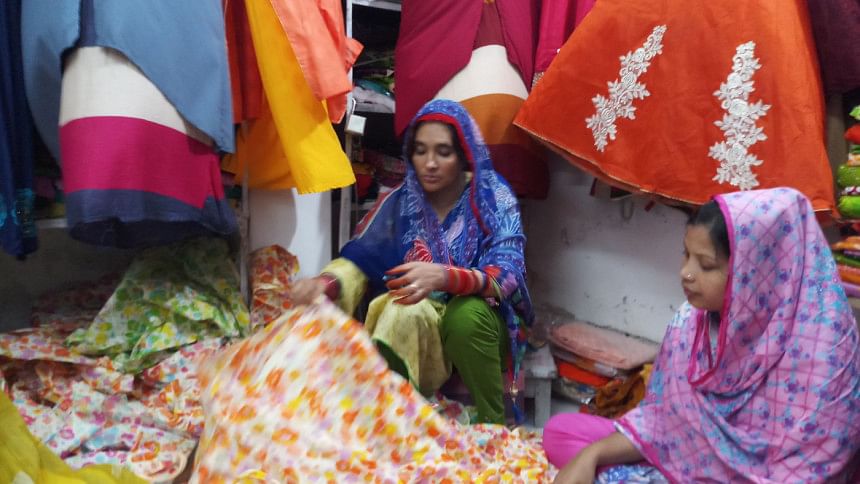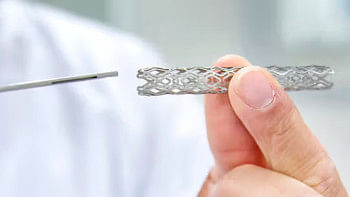The success story of Jharna

Jharna Begum, who once sold clothes from door to door while covering her face to evade creditors, is now the centre of a tale of success that even intrigued the queen of the Netherlands.
Around 47 years old Jharna is now an example to women in her hometown Tongi. Many of the women working for her are trained by a fashion designer from the Netherlands.
In 1995, Jharna’s husband Shamsul Islam had returned to Dhaka from the Middle East with Tk 5 lakh earnings. But the couple lost the money in no time as a joint business with a relative miserably failed.
But Jharna did not give up. She used to make handcrafts at home and do embroideries for many renowned brands, including Aarong. Despite the financial hardship, Jharna joined the Ansar VDP club in Tongi that year. She learnt how to run small businesses by taking a course organised by the club.
Seeing her experience and initiatives, Duttapara Brac Nari Unnayan Samity gave her Tk 5,000 loan. With the money, she bought fabrics from Dhaka’s Islampur and earned Tk 6,000 by selling those to women at Duttapara in Tongi.
Later, she bought fabrics worth Tk 6,000 and made more profit. The profit rate never went downwards and today she earns Tk 70,000 a month.
In 2005, Jharna attended a seminar on SME (small and medium enterprise), arranged by Brac, at a factory of Viyellatex Ltd in Gazipur. The then ambassador of the Netherlands also attended the seminar.
After hearing Jharna’s story, the officials visited her home in Duttapara. They made a video of the place and the tasks carried out there.
In 2014, Queen Máxima of the Netherlands visited the place and heard from Jharna about her journey. Amazed, she asked Jharna what she wanted. Jharna stated her desire to support street children and abused women with money earned by selling clothes.
Queen Máxima promised her that she would provide her modern sewing machines and also send a designer to train her workers.
“Within a few days, the queen sent seven very modern sewing machines via an UNDP official to my place. A few days later, a fashion designer named Rose Merry arrived from the Netherlands. She stayed at my place for one-and-a-half months and trained me and my workers,” Jharna told this correspondent. “The queen came to my place earlier this year to check on me,” she added.
During a visit in early August, this correspondent found a number of customers purchasing clothes and placing orders at “Jharna Fashions”, the store Jharna runs at her home.
In one room, Jharna keeps her products while sewing and cutting take place in another room on the ground floor. She and her family live on the first floor of the two-storey building.
Her husband Shamsul mostly stays at home and helps Jharna with the business. The couple has two children -- a son and a daughter. The daughter had been married off while the son earned a paltry amount from a job at a private company, Jharna said, adding that she bore almost all the expenses of the family.
A total 20 women are currently working in her factory.
Among them, eight are sewing machine operators while the rest are cutting masters. One cutting master, Zayeda Parvin, who took training from Rose Merry, can make various ladies wear, including skirts, palazzo pants, and frocks.
Jharna now goes to Islampur at least twice a week to buy fabrics. She got about eight street kids admitted to a local school in Tongi.
“After school, the children come to my place to have lunch. Then they help us by folding clothes, lend a hand in dealing customers too,” Jharna told this paper.
She further said that although most of her customers were from Tongi and greater Gazipur, she has some eight to ten customers who time to time place orders from abroad. “My place became more known after the queen’s visit,” she said.
There was a time when Jharna could not pay her workers duly. “The workers used to crowd my place for payments. To hide from them, I used to cover my face with a scarf and sell clothes door to door for money,” she recalled.
Masuda Ahmed, a long-time customer of Jharna, said, “I come to her place whenever I need to buy clothes. I first came here in 1995 when the rate of a yard of cotton was only Tk 20.”
Parvin Akhter of Shokundibag said prices of clothes at Jharna House were lower than that in markets of Tongi.
“I get modern, elegant clothes at Jharna apa’s place,” said another customer, Farzana Akhter.
This correspondent bought a three-piece outfit from Jharna House at Tk 1,200. He checked and found out that similar products were selling for Tk 3,500 at other shops in Tongi.
“I always wanted to serve the people, never thought of gaining solvency. I believe it was my intention to serve people that helped me establish myself as an entrepreneur,” Jharna said.

 For all latest news, follow The Daily Star's Google News channel.
For all latest news, follow The Daily Star's Google News channel. 



Comments